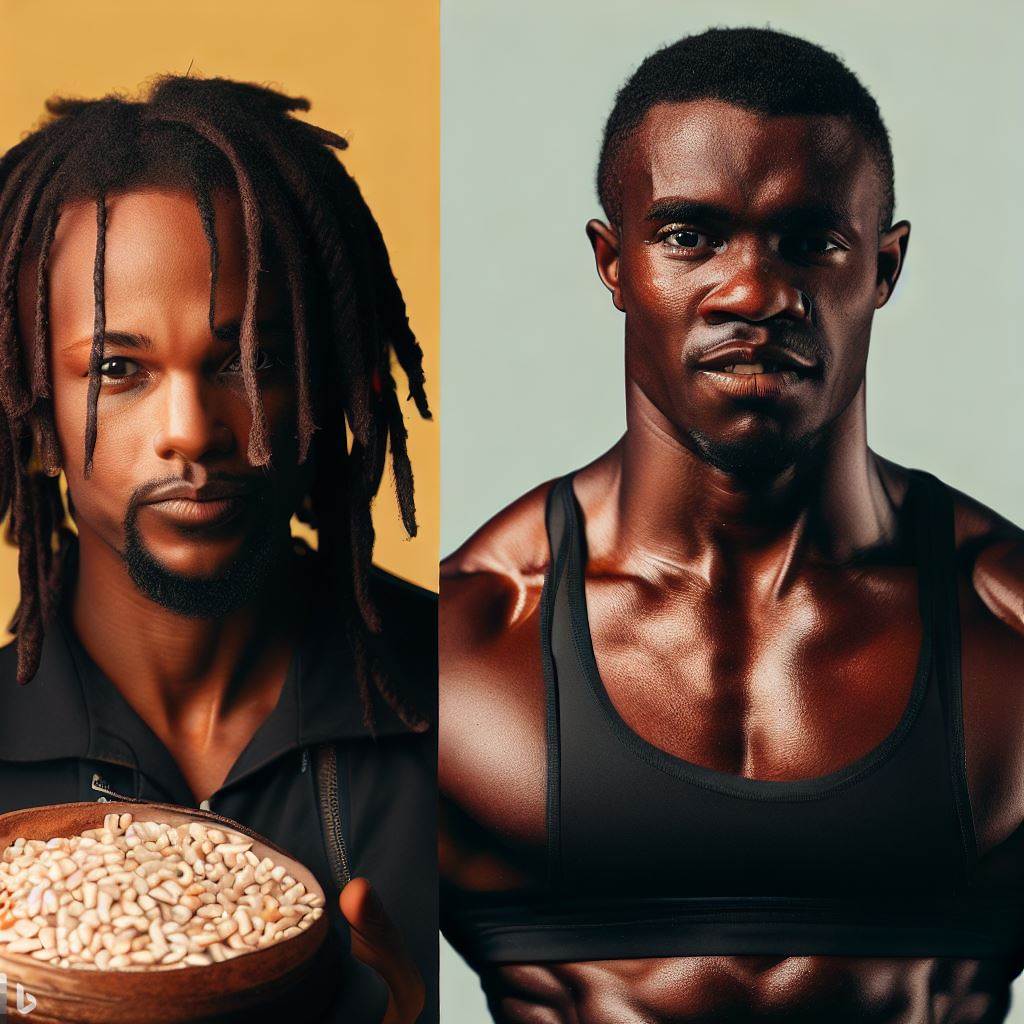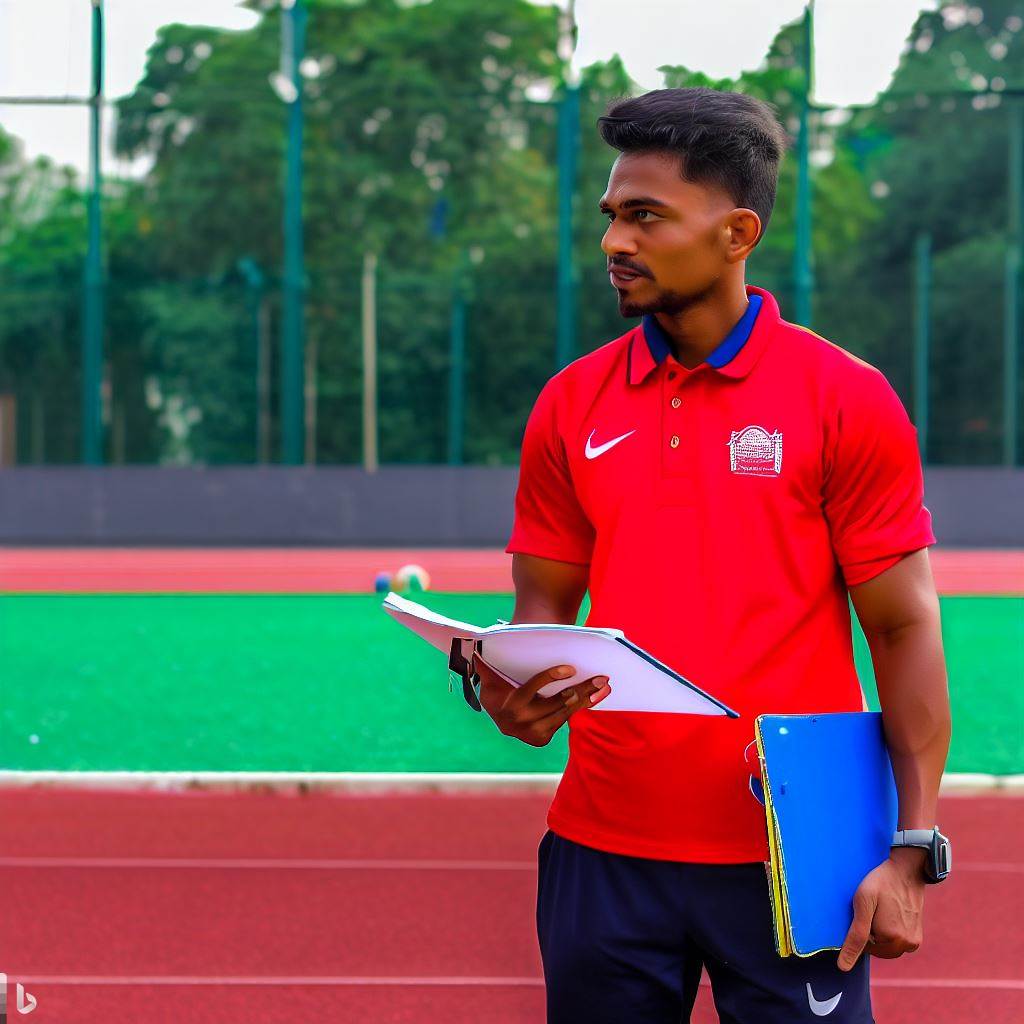Introduction
In recent years, there has been a noticeable surge in the importance placed on fitness and nutrition among athletes in Nigeria.
The numbers speak for themselves, with statistics indicating a significant rise in interest and awareness in these areas.
This increased focus on fitness nutrition has had a profound impact on the athletes’ performance, health, and overall well-being.
Athletes understand that their bodies are their most critical tools, and they have recognized the importance of fueling these tools with proper nutrition.
A balanced diet, consisting of the right nutrients, vitamins, and minerals, is essential for athletes’ continual growth and development.
By paying attention to what they consume, athletes in Nigeria have witnessed remarkable improvements in their physical performance.
The impact of fitness nutrition extends beyond athletic performance. A healthy diet not only optimizes an athlete’s physical attributes but also plays a crucial role in their overall well-being.
Proper nutrition aids in boosting the immune system, reducing the risk of injuries, and enhancing recovery. It also positively affects mood, mental focus, and concentration, enabling athletes to excel in their respective sports.
Therefore, the rise of fitness nutrition in Nigeria has led to increased awareness and education in the field. Athletes are now more conscious of their dietary choices, seeking guidance from nutritionists and fitness experts.
This knowledge empowers athletes to make informed decisions about their nutritional intake and optimize their performance accordingly.
In essence, fitness nutrition is an integral part of an athlete’s journey in Nigeria.
The increase in interest and dedication to maintaining a healthy diet has undoubtedly made a significant impact on their performance and overall well-being.
As athletes continue to prioritize their nutritional needs, the future holds promising advancements in the field of fitness nutrition.
The Importance of Fitness Nutrition for Athletes
A. Explanation of fitness nutrition
Fitness nutrition refers to the diet and nutritional choices made by athletes to support their physical activities and maximize their performance.
B. The impact of nutrition on athletic performance
Proper nutrition plays a crucial role in an athlete’s performance, enhancing their overall abilities and aiding in achieving their goals.
- Enhanced energy levels and stamina: Consuming nutritious foods and maintaining a balanced diet provides athletes with the necessary energy to perform at their best throughout their training sessions and competitions.
- Improved recovery and reduced risk of injuries: The right combination of nutrients helps in the efficient recovery of muscles, minimizes muscle soreness, and decreases the risk of injuries, allowing athletes to train consistently.
- Optimal muscle growth and development: Proper nutrition, particularly protein intake, supports muscle growth and repair, essential for athletes to build and maintain lean muscle mass.
C. Specific challenges faced by athletes in Nigeria regarding nutrition
Despite the benefits of fitness nutrition, athletes in Nigeria face specific challenges that hinder their access to proper nutrition.
Inadequate nutrition education and awareness among athletes and their coaches contribute to improper dietary choices.
Poor socioeconomic conditions may limit athletes’ ability to afford nutritious foods necessary for their performance.
Unavailability of sports-specific dietary guidance and limited access to sports nutritionists leaves athletes to rely on generalized nutritional information.
The prevalence of traditional beliefs and cultural practices regarding nutrition in Nigeria may conflict with optimal dietary requirements for athletes.
Food insecurity and limited availability of appropriate nutritional options within training facilities and competition venues further impact athletes’ nutrition.
To address these challenges, it is important for athletes, coaches, and sports institutions in Nigeria to prioritize fitness nutrition.
Efforts should be made to educate athletes about the essential role of nutrition in enhancing their performance and overall health.
Collaboration with nutrition professionals, specifically sports dietitians, can provide personalized guidance to athletes based on their individual needs and goals.
Government and sports organizations should invest in creating awareness campaigns, nutritional support programs, and funding opportunities for athletes to access proper nutrition.
In a nutshell, fitness nutrition plays a crucial role in optimizing athlete performance in Nigeria.
Understanding the impact of nutrition on energy levels, recovery, and muscle development can help athletes overcome specific challenges they face in accessing proper nutrition.
By giving importance to fitness nutrition and implementing necessary measures, athletes in Nigeria can achieve their full athletic potential and contribute to the country’s success in sports.
Read: Certification for Assistant Athletic Trainers in Nigeria
Common Dietary Needs of Athletes in Nigeria
A. Overview of macronutrients (carbohydrates, proteins, and fats) and their role in athletic nutrition
- Carbohydrates: Carbs are the primary source of energy for athletes, providing fuel for intense physical activities.
- Proteins: Proteins are crucial for muscle repair and growth, aiding athletes in recovering from intense workouts.
- Fats: Healthy fats are essential for maintaining hormone balance, supporting brain function, and providing energy.
B. Highlighting the necessity of micronutrients (vitamins and minerals) for athletes
- Vitamins: Athletes need an adequate intake of vitamins to support various bodily functions, such as energy production and immune system health.
- Minerals: Minerals play a vital role in muscle contractions, nerve transmissions, and overall athletic performance.
C. The importance of water and hydration for optimal athletic performance
- Water: Proper hydration is essential for athletes as it regulates body temperature and transports nutrients to cells.
- Hydration: Athletes should drink sufficient amounts of water before, during, and after exercise to prevent dehydration.
- Electrolytes: Consuming electrolyte-rich fluids is crucial for replenishing the minerals lost through sweat during physical activity.
In general, athletes in Nigeria have specific dietary needs to enhance their athletic performance.
Macronutrients like carbohydrates, proteins, and fats play essential roles in providing energy, aiding muscle repair, and supporting bodily functions.
Micronutrients, such as vitamins and minerals, are necessary for various physiological processes.
Proper hydration, including adequate water intake and replenishment of electrolytes, is crucial for athletes to maintain optimal performance and prevent dehydration.
Meeting these dietary requirements can significantly impact the overall health and performance of athletes in Nigeria.
Read: Legal Aspects of Assistant Coaching in Nigeria

Traditional Nigerian Diets and their Nutritional Value
In the realm of fitness nutrition for athletes in Nigeria, traditional diets are a hidden treasure trove.
Let’s delve into this rich culinary heritage and unlock its potential.
A. Exploration of traditional Nigerian cuisines and their significance in athlete nutrition
1. Key ingredients often found in Nigerian dishes:
- Yam: A carbohydrate powerhouse, providing sustained energy.
- Plantains: Rich in complex carbs, vitamins, and fiber.
- Peppers: Packed with vitamins A and C, aiding immunity.
- Palm oil: A source of healthy fats, crucial for athletes.
- Lean meats: Protein for muscle repair and growth.
2. The nutritional benefits of traditional staples:
- Egusi Soup: A protein-packed dish with leafy greens.
- Jollof Rice: High in carbs and essential minerals.
- Suya: A protein-rich snack, perfect for recovery.
- Fufu: Offers carbs for energy and digestion.
- Okra Soup: Nutrient-dense and great for joints.
B. How traditional diets can be modified to meet the specific needs of athletes
- Increased Protein: Incorporate more lean meats or beans to enhance muscle recovery.
- Balanced Macros: Adjust portion sizes for a balanced carb-protein-fat ratio.
- Hydration: Consume enough water-rich fruits like watermelon.
- Supplements: Consider additional vitamins and minerals as needed.
- Timing: Align meals with training sessions for optimum energy.
Traditional Nigerian diets are a goldmine of nutrition for athletes.
By adapting these traditional dishes, athletes can harness their benefits for peak performance.
The secret to athletic success in Nigeria might just lie in a bowl of Egusi Soup or a plate of Jollof Rice.
Read: Networking Tips for Assistant Coaches in Nigeria
The Role of Supplements in Athlete Nutrition
A. Explanation of common supplements used by athletes in Nigeria
Athletes in Nigeria commonly use various supplements to enhance their performance and support their nutritional needs.
Some of the commonly used supplements include:
B. The benefits and precautions of using supplements
The use of supplements by athletes can offer several benefits in terms of performance and overall health.
These benefits include:
- Enhanced muscle growth and recovery: Protein powders and BCAAs aid in muscle repair and growth, leading to improved athletic performance.
- Increase in energy levels: Certain supplements, like creatine, can provide athletes with an energy boost, allowing them to train harder and longer.
- Improved nutrient intake: Supplements can help athletes meet their daily nutritional needs, ensuring they have all the necessary vitamins, minerals, and amino acids for optimal performance.
While supplements can be beneficial, precautions must be taken to ensure their safe and effective use:
- Quality and safety: Athletes should choose supplements from reputable brands to ensure they are free from contaminants and meet quality standards.
- Proper dosage: Following the recommended dosage is crucial to avoid any potential adverse effects or imbalances in nutrient intake.
- No substitute for a balanced diet: Supplements should complement a healthy and well-rounded diet rather than replacing whole foods.
- Individual variations: Every athlete is unique, and the response to supplements may vary. Consulting a healthcare professional can help determine the most suitable supplements for an individual.
C. The importance of consulting with a nutritionist or dietitian before incorporating supplements into the diet
The significance of seeking guidance from a nutritionist or dietitian before introducing supplements into an athlete’s diet cannot be emphasized enough.
These professionals can provide personalized advice and help in the following ways:
- Evaluating individual needs: Nutritionists or dietitians can assess an athlete’s specific dietary requirements and identify any nutrient deficiencies or excesses.
- Designing a tailored plan: They can create a nutrition plan that incorporates supplements, ensuring they are used appropriately and in conjunction with the athlete’s overall diet.
- Monitoring and adjusting: Nutritionists or dietitians can monitor an athlete’s progress and make necessary adjustments to supplement usage based on the individual’s changing needs.
- Minimizing risks: By consulting a professional, athletes can minimize the risks associated with improper supplement use and avoid potential side effects or interactions with medications.
Overall, supplements can play a valuable role in athlete nutrition in Nigeria. However, it is essential to approach their use with caution, proper knowledge, and guidance from qualified professionals.
Read: Ethics and Best Practices: Athletic Training in Nigeria
Overcoming Challenges in Athlete Nutrition in Nigeria
A. The main challenges faced by athletes regarding nutrition
- Limited access to information about proper nutrition and its impact on performance.
- Inadequate financial resources to afford nutritious food and supplements.
- Lack of availability of quality nutrition resources in certain regions of Nigeria.
- Cultural beliefs and practices that may not prioritize nutrition for athletes.
- Inconsistent and unreliable supply of nutrition resources.
B. Strategies to overcome these challenges
- Implement education and awareness programs to promote the importance of proper nutrition.
- Collaborate with government, sports agencies, and private organizations to ensure affordable and quality nutrition resources.
- Establish partnerships with nutrition experts to provide personalized guidance to athletes.
- Create nutrition guidelines specific to Nigerian athletes’ dietary needs and cultural preferences.
- Conduct research to identify affordable and locally available nutrition alternatives.
1. Education and awareness programs
Develop and implement nutrition education programs targeting athletes, coaches, and parents.
These programs should emphasize the role of nutrition in maximizing performance and preventing injuries.
Workshops, seminars, and online resources can be utilized to reach a wider audience.
2. Access to affordable and quality nutrition resources
Collaborate with relevant stakeholders to establish partnerships that ensure the availability of nutritious food and supplements at affordable prices.
This can involve negotiating with suppliers, exploring subsidy options, and leveraging private sector support. Distribution networks should be strengthened for efficient delivery.
C. Success stories and initiatives addressing nutrition in Nigerian athletes
Despite the challenges, several success stories and initiatives have emerged to address athlete nutrition in Nigeria.
- The Nigerian Olympic Committee has partnered with nutritionists to educate and provide tailored nutrition plans for athletes.
- Local sports organizations, such as the Nigerian Football Federation, have implemented nutrition programs to enhance players’ performance and overall health.
- Non-governmental organizations like the Nigeria Sports Development Fund have initiated projects to improve access to nutritious food for young athletes in underserved communities.
- Prominent athletes, such as Blessing Okagbare, have advocated for increased investment in athlete nutrition and have personally supported fellow athletes in accessing quality nutrition resources.
In review, athlete nutrition in Nigeria faces various challenges, including limited access to information, financial constraints, and cultural beliefs.
Generally, through education, collaboration, and targeted strategies, these challenges can be overcome, ensuring that Nigerian athletes have the necessary nutrition to thrive and succeed in their respective sports.
Conclusion
A. Recap of the importance of fitness nutrition for athletes in Nigeria
Fitness nutrition plays a crucial role in the performance and overall well-being of athletes in Nigeria.
Proper nutrition provides the essential nutrients needed for energy, strength, and recovery. It also helps to prevent injuries and improve endurance.
B. Call to action for athletes and the Nigerian sports community to prioritize their nutritional needs
It is vital for athletes and the Nigerian sports community to prioritize their nutritional needs.
This includes consuming a balanced diet rich in carbohydrates, proteins, healthy fats, vitamins, and minerals.
In short, proper hydration should not be overlooked.
C. Final thoughts on the future of fitness nutrition for athletes in Nigeria
The future of fitness nutrition for athletes in Nigeria is promising. With growing awareness and advancements in sports science, there is a greater emphasis on evidence-based nutrition practices.
It is essential for athletes to work closely with nutritionists and professionals to optimize their performance and achieve their goals.
Lastly, fitness nutrition is of utmost importance for athletes in Nigeria. It directly impacts their performance, recovery, and overall health.
By prioritizing their nutritional needs and seeking professional guidance, athletes can enhance their athletic abilities and contribute to the success of Nigerian sports on a global scale.
So, let’s make fitness nutrition a top priority and fuel our bodies for success!




